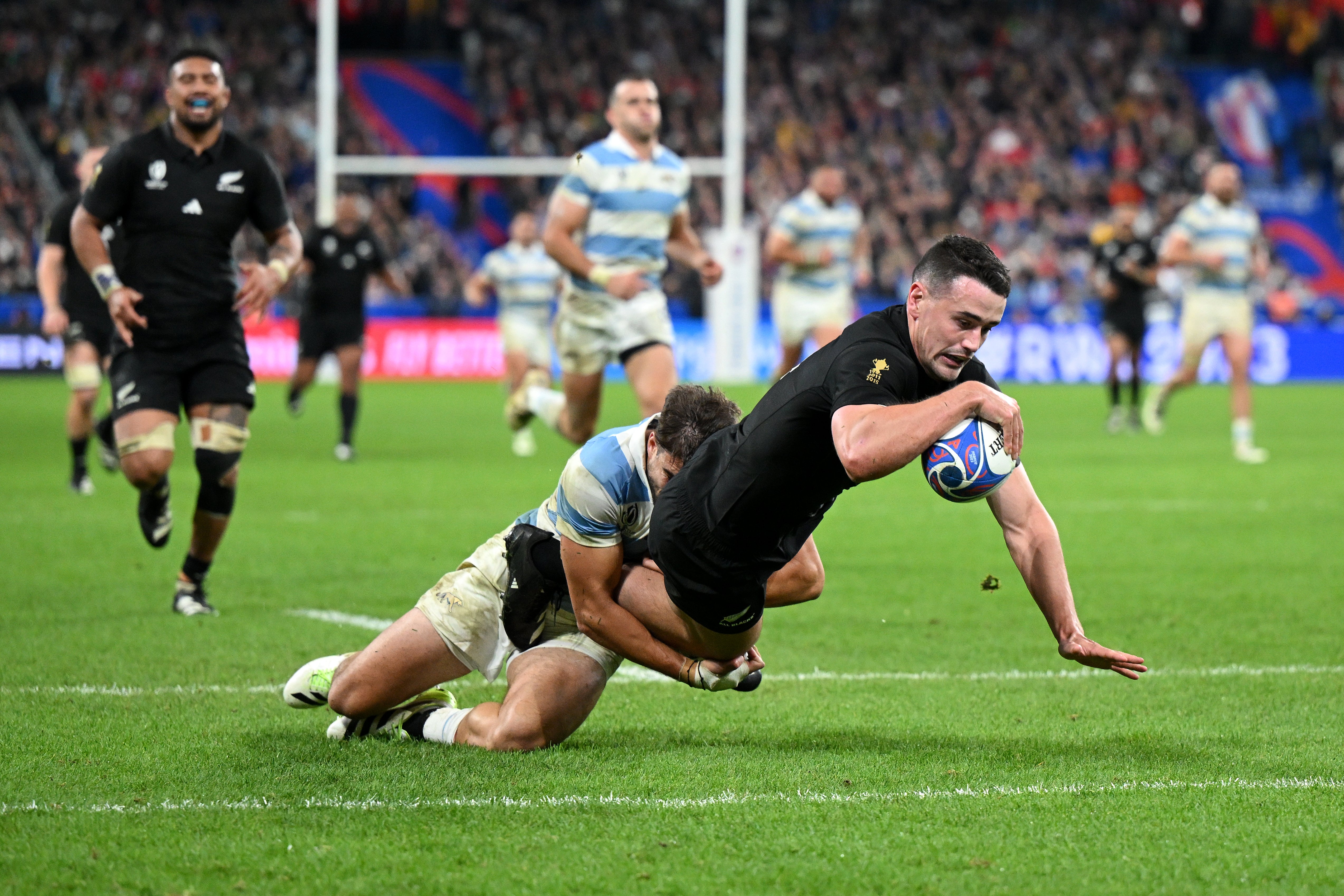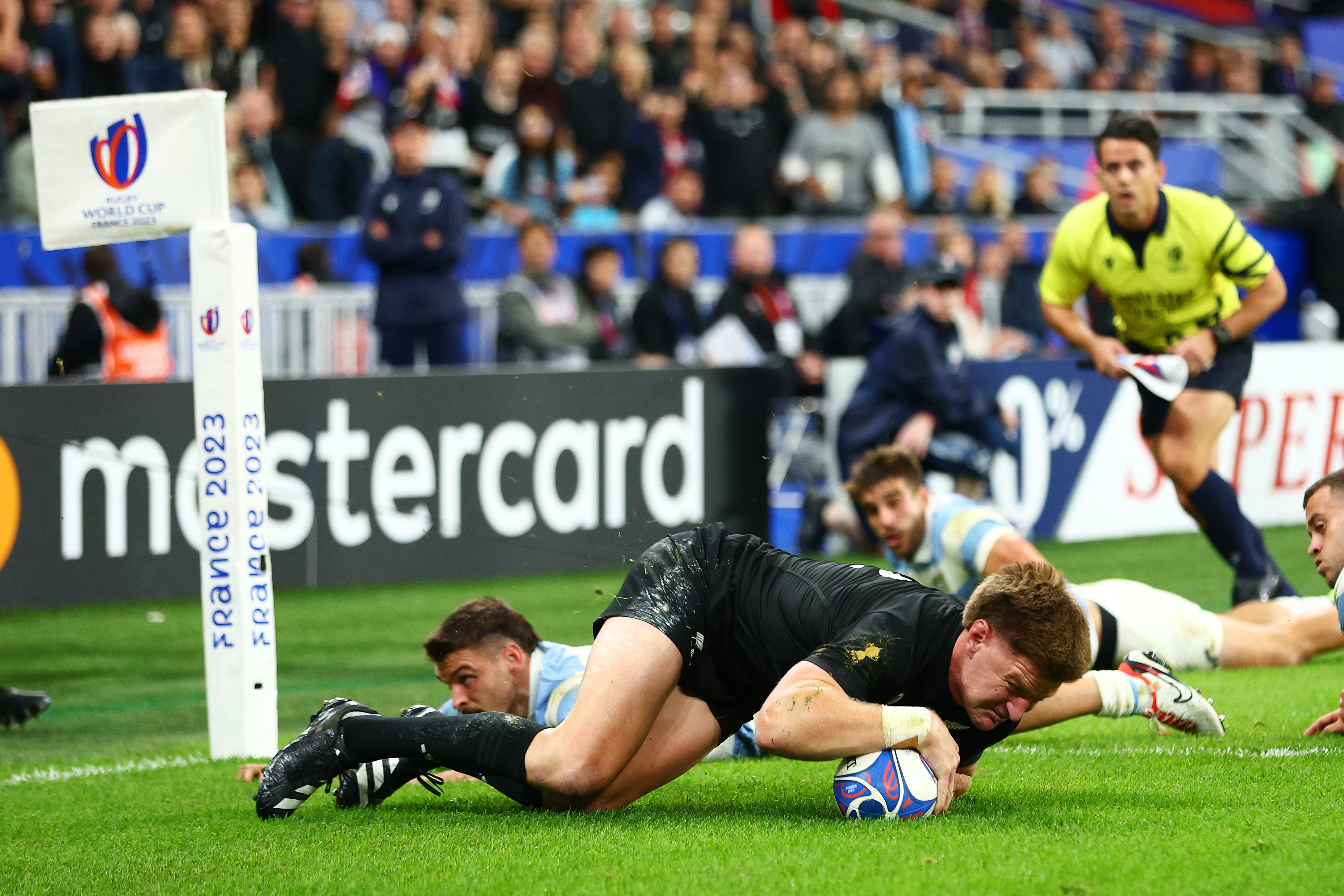
New Zealand destroyed Argentina at the Stade de France
Sign up to our free sport newsletter for all the latest news on everything from cycling to boxing
Sign up to our free sport email for all the latest news
Thanks for signing up to the
Sport email
What a difference a week makes. Last weekend, the Stade de France was treated to the two greatest Rugby World Cup quarter-finals of all time, perhaps the best pair of sporting events ever witnessed at a single stadium in the space of 24 hours.
Five days on, New Zealand comfortably dispatched an out-gunned and overmatched Argentina side 44-6 to begin semi-final weekend with a contest that not only won’t go down in the folklore of the French national stadium but may well be forgotten by the majority of spectators here before they get home.
Not every match can be a classic and make no mistake, the All Blacks won’t mind one bit that their passage to a record fifth men’s Rugby World Cup final was so serene. They were simply superb and came perilously close to breaking their own record margin of victory in a World Cup semi-final (a 49-6 hammering of Wales in 1987) but had to settle for just the 38-point triumph in a seven-try demolition. Their ruthlessly efficient performance suggests the crisis of the summer of 2022 is well and truly behind them and a mouth-watering battle with South Africa to become the first four-time winners of this competition next Saturday seems almost inevitable.
But from the adrenaline-fuelled highs delivered by last weekend’s iconic double-header, this was the ultimate comedown. From a flat atmosphere more reminiscent of a warm-up match than a World Cup semi-final, to a one-sided encounter that demonstrated the gulf in class between the teams – the feeling that this was an event very much ‘after the Lord Mayor’s show’ was unavoidable throughout, which is to take nothing away from New Zealand. You can only beat who’s in front of you.
Perhaps it was an inevitable consequence of World Rugby’s ludicrous decision to decide the World Cup groups three years ahead of the tournament, which led to an almost hilariously lopsided draw. The four best teams in the world did battle with each other, while four more flawed but relatively even teams also competed on a quarter-final weekend for the ages. When the elite two then face the weaker pair with a place in the final at stake, this damp squib of a semi-final is an unfortunate inevitability.
The intensity of the Argentina celebrations and laps of honour after they beat Wales in the last eight suggested they had come as far as they believed they could and New Zealand ruthlessly confirmed that.
New Zealand ran in try after try against Argentina
For the underdogs to stand any chance of causing the upset, they needed a fast start. It took until the 39th minute of the quarter-final for the Pumas to finally get on the scoreboard, by which time Wales should have been out of sight – the fact that Warren Gatland’s men were only 10 points to the good at that stage eventually came back to haunt them but there was faint hope New Zealand would be similarly wasteful.
A week later, Argentina struck first as a sustained spell of possession in the All Blacks 22 from the opening kick-off led to three points from the boot of Emiliano Boffelli but any hope that would lead to the start of something special was soon extinguished. The Pumas had plenty of ball in New Zealand territory as they went through the phases, yet the Black wall stiffened once they entered the 22 where their breakdown work, led by the formidably impressive back row of Shannon Frizell, Sam Cane and Ardie Savea, became more aggressive.
Jackalled turnovers were the norm and whereas Argentina were profligate, the All Blacks turned ball into points, usually off the back of their dominant maul. An early turnover in their own 22 led to a march down the field where a couple of phases in the tight after a five-metre lineout created space wide on the right. Richie Mo’unga’s long pass to Will Jordan exploited this as the winger dived over for what would be the first of a treble on the day.
Mark Tele’a had been dropped for the quarter-final win over Ireland due to breaching team protocol but, restored to the team in place of Leicester Fainga’anuku after a week in the wilderness, showed his class to have a huge hand in the second and third tries of the first half.
His opportunistic turnover on his own 22 after 13 phases of Pumas attack started a spell of gorgeous All Blacks running rugby as they sliced and offloaded their way up the pitch off for Jordie Barrett skittle through tackles for the try in the corner. Tele’a then showed off his power just before half-time as he barrelled and spun through three defenders to take New Zealand within inches of the line, where Frizzell could jog over in the corner on the following phase.
Jordie Barrett crashed over for the All Blacks’s second of seven tries
Given that no team had ever overcome a half-time deficit greater than seven points to win a World Cup semi-final, the 20-6 lead at the interval suggested it was game over and all doubt was removed just two minutes after the break when an All Blacks scrum on the 22 splintered the Pumas pack and the ageless Aaron Smith cut inside one defender, dummied past another and slid between two more for a sumptuous try.
From there, it was just the formality of completing the final 38 minutes to confirm a 35th New Zealand win in 37 editions of this fixture. They refused to take their foot off the gas as Frizell burrowed over the line for try number five and Jordan ran in two more to make it a remarkable 31 tries in 30 Tests for him and a tournament record-equalling eight at this World Cup as the toothless Pumas were further declawed.
His hat-trick score on 74 minutes was a thing of beauty as, starting in his own 22, he weaved between three defenders, then chipped over another on halfway before collecting his own kick to race in for the score. Message well and truly sent.
The All Blacks have become World Cup specialists over the past 15 years and yet more history is now within their grasp. This semi-final may not live long in the memory but lifting the Webb Ellis Trophy for the fourth time certainly would. That reality is now deservedly just 80 minutes away.
Source: Read Full Article


